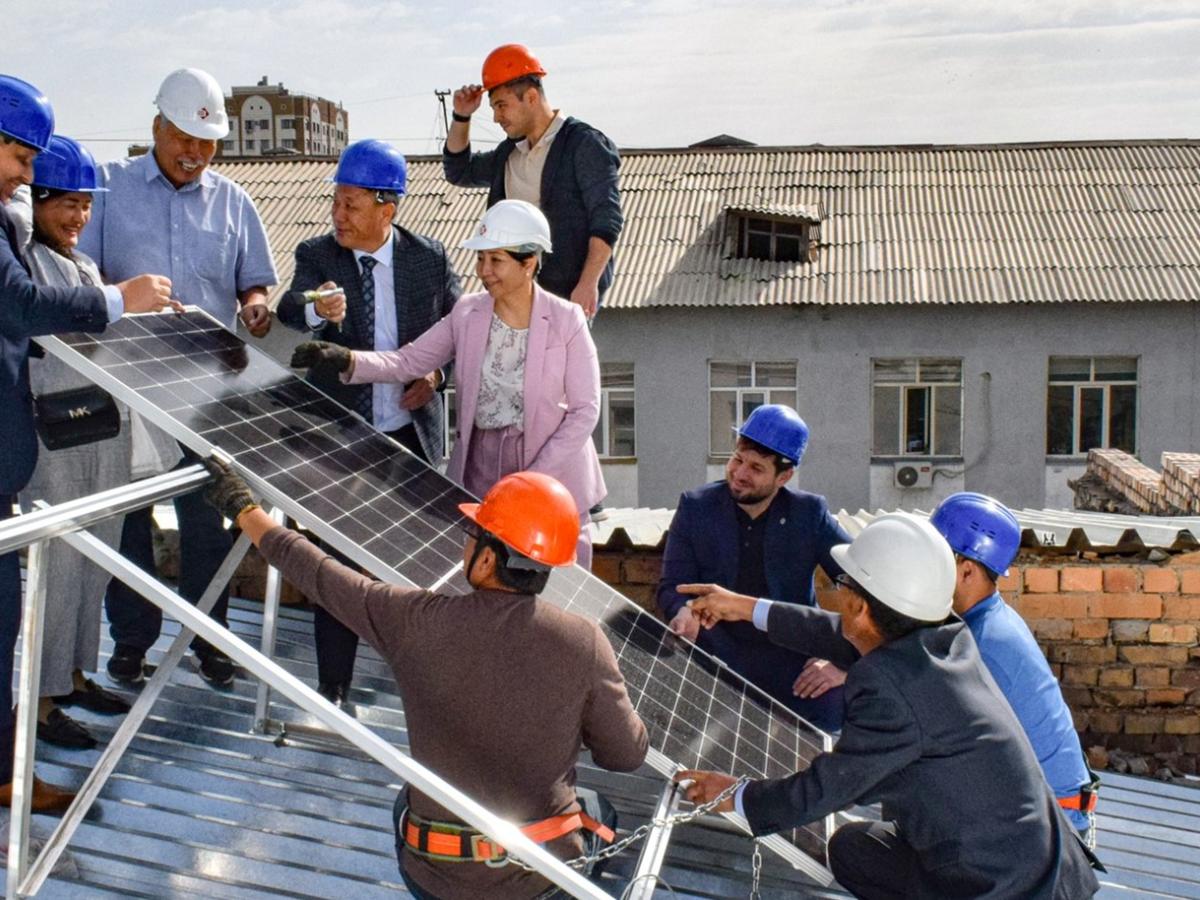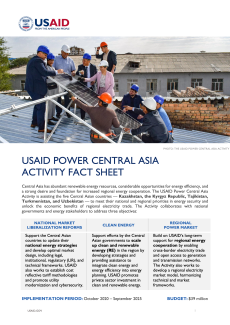2020 - 2025 | $39 Million
Central Asia has abundant renewable energy resources, considerable opportunities for energy efficiency, and a strong desire and foundation for increased regional energy cooperation. The USAID Power Central Asia Activity is assisting the five Central Asian countries — Kazakhstan, the Kyrgyz Republic, Tajikistan, Turkmenistan, and Uzbekistan — to meet their national and regional priorities in energy security and unlock the economic benefits of regional electricity trade. The Activity collaborates with national governments and energy stakeholders to address three objectives:
NATIONAL MARKET LIBERALIZATION REFORMS
Support the Central Asian countries to update their national energy strategies and develop optimal market design, including legal, institutional, regulatory (LIR), and technical frameworks. USAID also works to establish cost reflective tariff methodologies and promote utility modernization and cybersecurity.
CLEAN ENERGY
Support efforts by the Central Asian governments to scale up clean and renewable energy (RE) in the region by developing strategies and providing assistance to integrate clean energy and energy efficiency into energy planning. USAID promotes private sector investment in clean and renewable energy.
REGIONAL POWER MARKET
Build on USAID’s long-term support for regional energy cooperation by enabling cross-border electricity trade and open access to generation and transmission networks. The Activity also works to develop a regional electricity market model, harmonizing technical and market frameworks.
IMPLEMENTATION PERIOD: October 2020 – September 2025
BUDGET: $39 million
KAZAKHSTAN. USAID promotes international best practices to address climate change and improve investment in clean energy. USAID supported Kazakhstan’s decision to join the Global Methane Pledge in 2023. USAID-supported renewable energy auctions have reduced wind energy prices to a record 2.28 US cents/ kilowatt-hour. These interventions leveraged $3.87 billion in private investment, including through technical and legal advisory support on a 1-Gigawatt wind + BESS project worth $1.65 billion, to avoid 18 million tons CO2 emissions per year. USAID is upgrading the power trading platform and supporting the Market Council reform to facilitate market liberalization.
THE KYRGYZ REPUBLIC. USAID partners with the Ministry of Energy to reform the energy sector and support the clean energy transition, including analyzing challenges to integrate renewables to the grid, selecting the best sites for new projects, developing a National Grid Code, Power Purchase Agreements, and piloting small-scale projects. Also, USAID piloted the Kyrgyz Republic’s first on-grid roof-top solar system for Kyrgyz State Technical University (KSTU). USAID conducted a study on climate change’s impact on hydropower generation. USAID supported the Ministry of Energy in establishing a Gender Council and developed two websites to improve public services and transparency.
TAJIKISTAN. USAID helps Tajikistan model the power system, reduce distribution system losses, unbundle and corporatize utilities, and promote competitive procurement for renewable energy. To modernize Tajikistan’s energy market, USAID supported energy sector reforms through drafting Power Purchase Agreements, Commercial Agreements, a Grid Code, and a Metering Code. To improve clean energy investment and energy efficiency, USAID also identified Renewable Energy Zones for the Ministry of Energy and Water Resources. USAID also provided an electronic document management system. USAID is adapting a renewable energy curriculum for the Tajikistan Energy Institute.
TURKMENISTAN. USAID helps identify opportunities for renewable energy projects, promotes renewable energy solutions, supports development of a low carbon strategy for the energy sector and assists in reducing methane emissions from the oil and gas sector. Through stakeholder working group discussions and data collection with national oil and gas companies, USAID developed a methane emissions reduction Action Plan, which led Turkmenistan to join the Global Methane Pledge in 2023.
UZBEKISTAN. USAID helps develop the national energy regulatory agency and new electricity market, pilot rooftop solar projects, improve corporate governance of the power sector, support renewable energy forecasting and integration of renewables to the grid, and explore modern hydrogen technologies, such as a Hydrogen Hub concept. USAID supports renewable energy generation through developing the Renewable Energy Investor’s Guide which leverages $1.4 billion in private investment and will reduce greenhouse gas emissions by 3.5 million tons of CO2 per year.
REGIONAL. USAID facilitates regional and cross-border electricity trade by developing national trade strategies and technical studies for countries’ participation in the regional electricity market. USAID advanced regional initiatives through partnerships between U.S. companies and local institutions and launched the American Innovation Center for Central Asia to connect Tashkent State Technical University with the University of Delaware to develop a Green Hydrogen Curriculum. USAID also provided $1.4 million in modern energy sector management equipment and software (SCADA video-wall and Wide Area Monitoring System) for the Coordinating Dispatch Center Energia.
CROSS-CUTTING. USAID provides support through training and gender equity initiatives. USAID trained 2,305 energy specialists (648 women), funded 20 energy sector master’s degree scholarships, and launched a Women and Youth Mentorship Network to promote gender equality and social inclusion.


